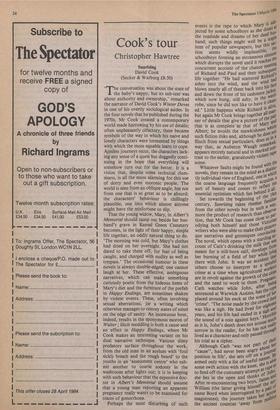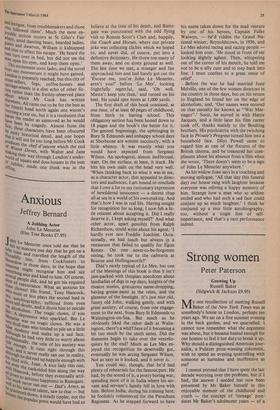Cook's tour
Christopher Hawtree
Sun rising David Cook (Secker & Warburg £8.50) 'rnhe conversation was about the state of
1. the baby's nappy, but its sub-text was about authority and ownership,' remarked the narrator of David Cook's Winter Doves in one of his overtly sociological asides. In the four novels that he published during the 1970s, Mr Cook created a contemporary world made harrowing by his use of details; often unpleasantly olfactory, these became symbols of the way in which his naive and lonely characters were tormented by things with which the more equable learn to cope. Aimless journeys recur, the characters lack- ing any sense of a quest but doggedly conti- nuing in the hope that everything will somehow turn out for the better. It is a vision that, despite some technical clum- siness, is all the more alarming for this use of dotty and even moronic people. The world is seen from an oblique angle, but not from one that is so great as to be absurd; the characters' behaviour is chillingly plausible, one into which almost anyone might have the misfortune to slip.
That the young widow, Mary, in Albert's Memorial should camp out beside her hus- band's grave in Kensal Green Cemetery becomes, in the light of their happy, simple life together, an oddly natural thing to do. 'The morning was cold, but Mary's clothes had dried on her overnight. She had not dared to take them off, for fear of being caught, and charged with nudity as well as trespass.' The occasional humour in these novels is always double-edged; one cannot laugh at her. These effective, ambiguous narratives, which can make something curiously poetic from the hideous items of Mary's diet and the furniture of the prefab in Happy Endings, are sometimes shaken by violent events. These, often involving sexual aberrations, jar a writing which otherwise manages to convey states of mind on the edge of sanity. An incestuous bout, indeed, results in the eponymous moron of Walter ; illicit meddling is both a cause and an effect in Happy Endings, where Mr Cook makes an interesting variant on his dual narrative technique. Various slimy predators surface throughout the work, from the old man in an asylum with 'foul sickly breath and the rough beard' to the youths in an 'assessment centre' who sub- mit another to coarse sodomy in the washroom after lights out; it is in keeping with such behaviour that the expensive doc- tor in Albert's Memorial should assume that a young man reporting an apparent pregnancy really wants to be examined for traces of gonorrhoea.
Perhaps the most disturbing of such events is the rape
jected by some schoolboys as she dozes at the roadside and dreams of her dead hos- band; such things might well be a staPle item of popular newspapers, but this sec" tion seems wildly implausible, the schoolboys forming an extraneous dental which disrupts the novel until it reaches the concurrent account of the chance tneetil of Richard and Paul and their subsecluers life together. 'He had scattered Richard ashes into the wind, and the wind — blown nearly all of them back into his fa and down the front of his cashmere jaekeAt: which now hung, still ashy, in the war" robe, since he did not like to have it clean' ed.' Little happens while Richard is alive' but again Mr Cook brings together all mfr ner of details that give a picture of the Pfd that is as complete as that of Mary a'.! Albert; he avoids the mawkishness wine such fiction risks and, although he dnes,ri°3 flinch from sexual particulars, does so,ned, way that, as Auberon Waugh reale"' appears entirely natural and in marked con, to the earlier, gratuitously violent role sceWne. hatever faults might be found with,nthce. novels, they remain in the mind as a dist,!!:.b tly individual view of England, one in wnt'a the coarse language frequently acquit the sort of beauty and comes to reflect all essential optimism which lies behind it 90 Set towards the beginning of the 1,14r century, Sunrising takes themes far11,„ from the other novels but in such a v""',1: more the product of research than obse,i'var. tion, that Mr Cook has come close to rAar, odying both himself and those Viet°",.e. writers who were able to make their Pt rag, que narratives and grotesques COnvillelnac. The novel, which opens with a startling_as count of Cath's drinking the milk that woin meant for a still-born calf, develoPs from her burning of a field of hay tha there with John. It was an aceiclen`iieful others choose to interpret as a sP''i;ers crime at a time when agricultural wor;ies are in revolt against the growth of the and the need to work in them. Pregr3Tng Cath watches while John, after hero sentenced at Warwick Assizes, has tnefr. bet placed around his neck at the scene ,°,ben `crime'. 'The noise made by the crowd een was like a sigh. He had lived for eight,,nci years, and his life had ended in a signrr ibie the sound of a coin against keys. g°nch as it is, John's death does not arouse Many sorrow in the reader, for he has not re..A hlivisedtriaals aacshaarcaipctheerrand only passed throur
Although Cath 'was not part
of beer "cause", had never been angrY a',°,.„rneY position in life', she sets off on a J" 0y armed only with a list of useful namesable some swift action with the knee, she is as to fend off the customary attempt at raloeto she lies in the open and thinks of and After re-encountering two boys, Jam sur- William (the latter giving himself theair of name Boyd when interrogated by P cross magistrates), the journey takes her 3 WO the ancient counties 'away from P° and intrigue, from troublemakers and those who followed them'. Much the most en- J°Yable section occurs at St Giles's Fair where, amid dancing bears, bearded ladies, giants and dwarves, William is kidnapped and tries to effect his escape. 'He heard the elan turn over in bed, but did not see the Mari open his eyes, and keep them open.' loses excitement soon fades, and the novel
ally momentum it might have gained. London is presently reached, but this city of
street-sellers, fogs, coffee-houses and O ' finage-wheels is a dim echo of other fic- tion rather than the freshly-observed place about which Mr Cook has written elsewhere. All turns out to be for the best as tile friends head north again one winter's 141°1.11U-1g a year on, but it is a resolution that eaves the reader as unmoved as he would ve been by tragedy. Almost from the Ibirst, t these characters have been obscured nitY historical detail, and one hopes
i
at t will not be too long before Mr Cook produces the the d'oeuvre which the end of Winter Doves, with Walter and June Woking
:fd their way through London's under- of squats and o do ness-hous in
thk eswas in thine year Jubilee' made the offing











































 Previous page
Previous page